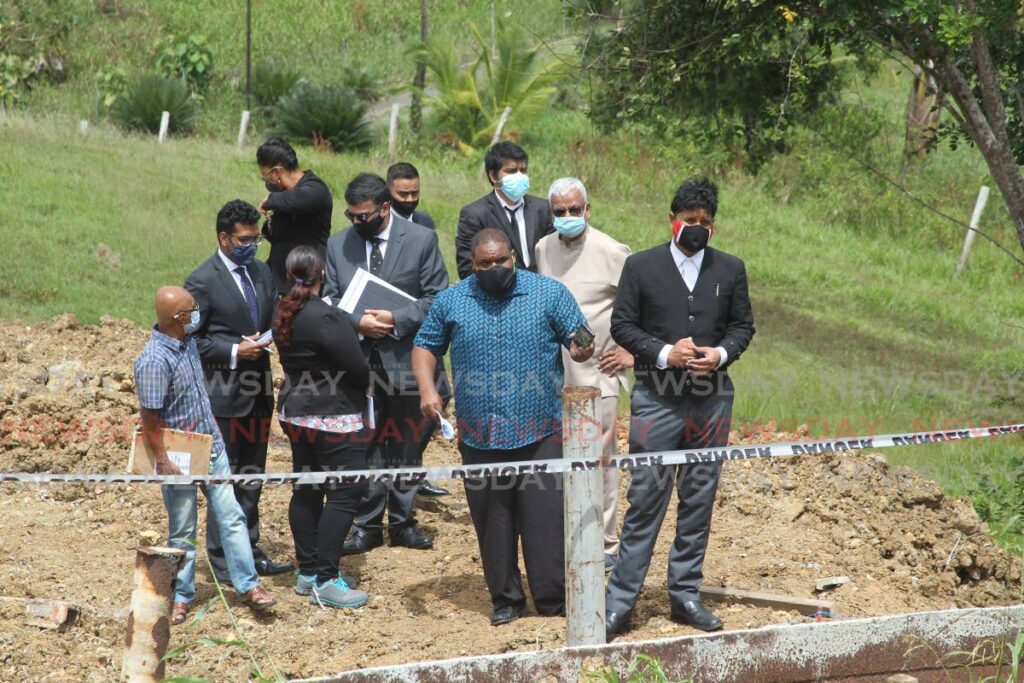Judge slams Penal/Debe Corporation for digging up graves at Monkey Town

A HIGH COURT judge has labelled “reprehensible and deplorable” the actions of the Penal/Debe Regional Corporation (PDRC) in January when its contractor unearthed grave plots belonging to a Barrackpore family at the Monkey Town public cemetery.
Justice Frank Seepersad made the observations as he awarded $122,500 to Savtri Sookram and her brother-in-law, Bachan Sookram, for the actions of the PDRC.
In an oral decision on Thursday, Seepersad said the corporation failed to determine where burial plots were located before embarking on shoring-up and roadworks at the cemetery.
"There is a process for exhumation and relocation and that process was not followed."
He said the PDRC failed to discharge its statutory obligations as set out in the Burial Grounds Act for exhuming human remains. This, he said, amounted to a significant dereliction of a public function, was “callous and reprehensible and should be condemned in the strongest of terms.
But he said the Sookram family could not claim a breach of statutory duty as a cause of action, since the legislation did not permit it.
Quoting 19th-century British prime minister Sir William Gladstone on how a community treated its dead, Seepersad said that the PDRC, from the beginning, defended the action, claiming the work done was outside the area where there were burial plots and the bones unearthed were animal bones, adding insult to injury.
He said, "The absence of accountability seems to be a curse we are saddled with in this republic. The court will not countenance this type of reprehensible behaviour by a public authority.”
He also said it must have been “traumatic” for the Sookram family to discover the burial plots of their dead relatives had been dug up. However, he did not award damages for psychiatric distress, since the claim was not supported by evidence.
He also found the PDRC had a duty of care – which the PDRC’s lawyers admitted – to the family, which had a grave grant to use the plot for familial burials, and this was breached.
Seepersad also found clear evidence of trespass, as the Sookram family plot was interfered with, finding as a fact that several graves belonging to the family were disturbed and remains removed by the PDRC's excavation work.
He said he observed, on a site visit in February, and based on the testimony of the cemetery keeper – who confirmed several graves at the cemetery were disturbed by the work – there does not appear to be proper record-keeping of where graves are located.
He said Adrian Hamlyn’s evidence was that no one from the PDRC consulted him before work started at the cemetery, and there was no master plan of plots to establish who is buried where, outside of the cemetery keeper’s knowledge.
“Having addressed its mind to relevant case law, the court is resolute in its view that the defendant acted in a manner which was not indicative of the basic sense of respect and regard for the dead.”
He said the proper processes were not engaged and the conduct of the PDRC was so “unacceptable and outrageous,” as it paid no attention to the sanctity with which mortal remains should be treated or the impact its “callous behavour” had on the Sookram family.
“The assault on the family was more significant than a physical assault. A wound inflicted with piece of wood can heal. To see your loved ones' final resting place destroyed and seeing human remains and pieces of coffin will remain for the rest of their lives.”
Sookram took the corporation to court alleging that roadworks at the entrance of the Monkey Town Public Cemetery had unearthed her family’s remains, including those of her late husband, who was buried there in 2018. Buried at the family’s plot, some three to four metres from the entrance to the cemetery, were her husband, her brother and sister-in-law and her husband’s parents. On January 19, 2020, she was told work was being done at the cemetery and her husband’s grave and those of his family had been dug up.
The family was represented by attorneys Indira Binda and Satesh Emrit while Narad Harrikissoon and Andre Sinanan represented the PDRC.

Comments
"Judge slams Penal/Debe Corporation for digging up graves at Monkey Town"